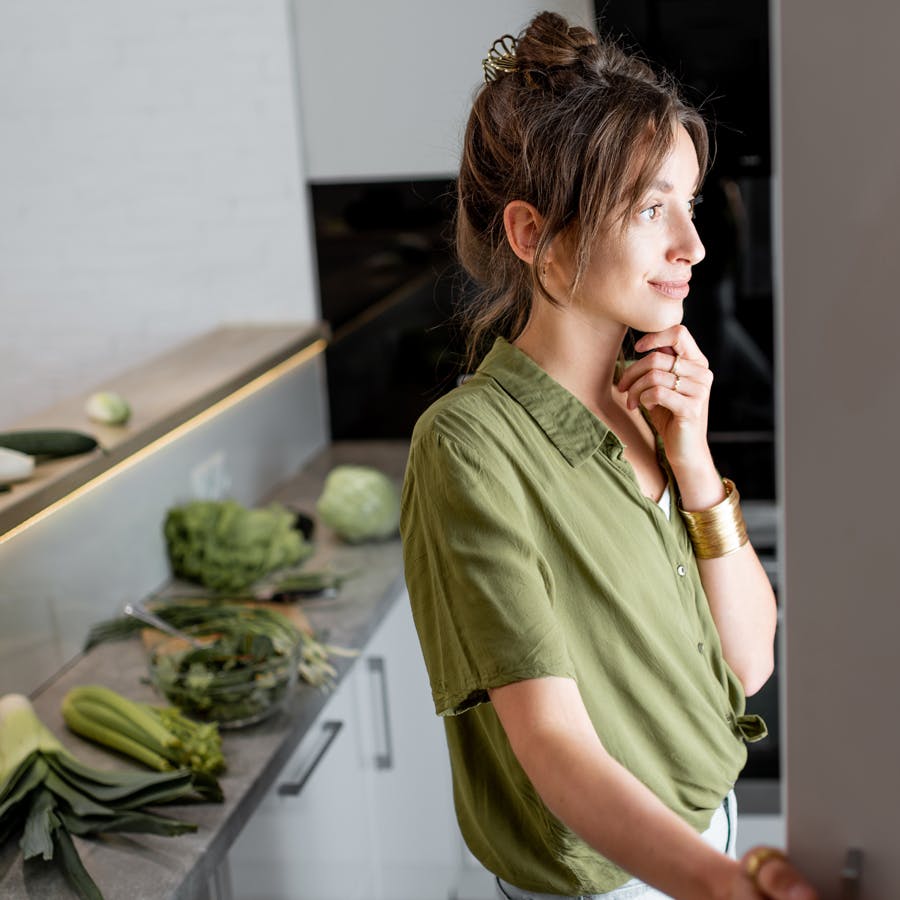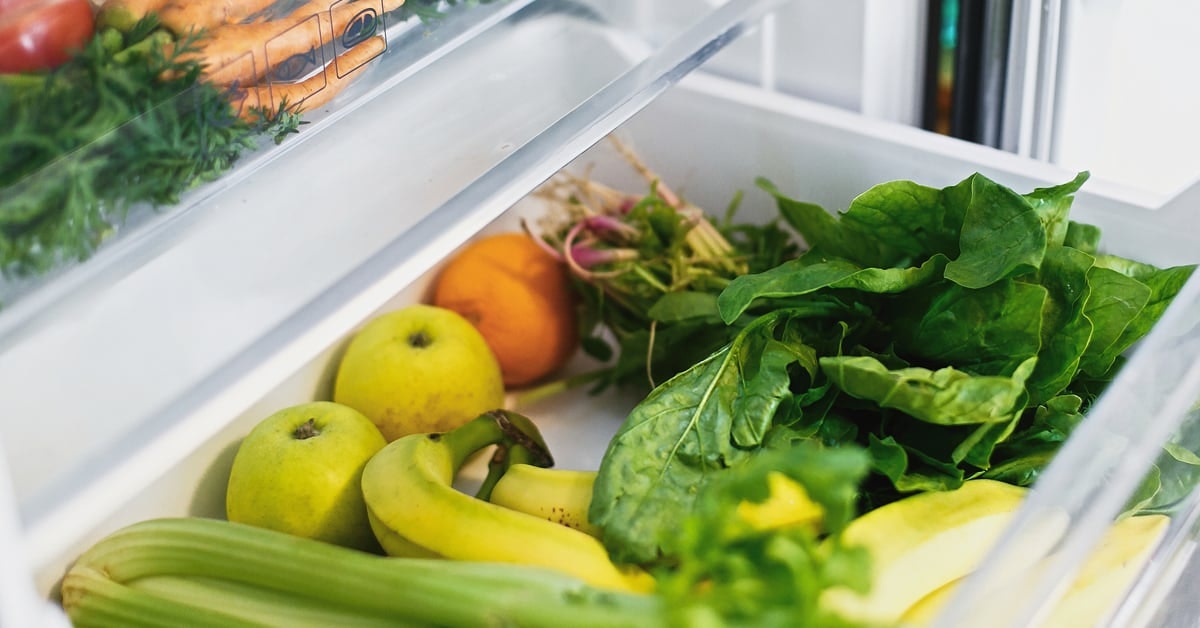Should I store all of my produce for juice in the refrigerator?
This is a common question from both the at-home juicer (especially when preparing for a juice cleanse) and the commercial juicer. Where I find most of the confusion lies is with the fact that not all produce REQUIRES refrigeration in order to stay fresh on the short-term.
However, when making juice, you will always want to start the juicing process with cold produce. The reasons for this? Generally speaking, it helps to make your juice safe and keep it fresher for longer. If you don’t use cold produce, your juice might be warm when it’s made. When juice is in the “temperature danger zone”, bacteria can grow rapidly, potentially making your juice unsafe. For more in-depth reading on how temperature affects juice, check out Keeping Juice Fresh – Time and Temperature Abuse.
In this article, we will cover recommendations for storing produce both at home and in a commercial kitchen.
Click on the Links Below to Jump to the Sections
Note: This How to Write a Juice Business Plan PDF is a step-by-step guide to helping you write a business plan for your juice business. Download it for free!


How To Store Fruits and Vegetables At Home
For optimal shelf life (or fridge life), each type of produce has their own way they prefer to be stored. In this section, we will cover specific storing recommendations for the fruits and veggies typically used in cold-pressed juice:
- Apples
- Beets
- Carrots
- Celery
- Cucumbers
- Citrus
- Ginger
- Leafy Greens
- Tomatoes
Apples
At room temperature, apples will last about a week. If stored in a refrigerator, they will last a month or two. Storing them in a plastic ziplock bag may extend the shelf life even longer. Chill them in the refrigerator for at least a few hours prior to making juice.
Beets
Remove the dirt from the beets, and if you wash them, make sure they are dried thoroughly. Put beets in a perforated plastic bag and store in the coldest part of your refrigerator (usually the bottom shelf or the crisper drawer). Stored this way, beets will stay fresh in the refrigerator for up to 3 months.
Carrots
Carrots will last 3-5 days without refrigeration, but will last 3-4 weeks if kept in the fridge. Make sure they are chilled for at least a few hours prior to making juice.
Celery
I’ve found the best way to keep celery fresh is to wash it, cut it, submerge in filtered water in an airtight container, and store in the refrigerator. If you are not going to cut it, then at least remove the plastic bag and store it whole, uncovered in the refrigerator or wrapped in tinfoil (this allows the ethylene to escape and prevent accelerated spoilage).
Cucumbers
Cucumbers are best stored at room temperature, just keep them away from other fruits and vegetables as they are sensitive to a natural gas (ethylene) that is emitted by other ripening produce. If stored below 50 degrees, they tend to go bad quicker, getting slimy and producing soft spots. I still recommend chilling in the refrigerator prior to making juice.

Lemons, Limes and Oranges
Left out at room temperature, citrus fruits will dry out and lose their juice. They are best kept refrigerated and will last about two to three weeks. If you put them in a ziplock bag or airtight container and keep them in the refrigerator, they can stay fresh for about a month.
Ginger
Store whole ginger in the refrigerator for up to one month, or place the whole root in a freezer bag, removing as much air as possible and freeze. Ginger will stay fresh for about six months in the freezer, just thaw in the refrigerator prior to juicing.

Leafy Greens
Wash and dry the greens, making sure they are really dry. Lay the greens out on paper towels, then roll them up loosely, place them in a plastic ziplock bag and store in the refrigerator. You can also store them in a large airtight container if you have room in your refrigerator. This should keep leafy greens like kale, spinach, romaine, watercress, chard, and parsley fresh for a week or more.
Pineapple
A ripe pineapple only lasts a few days unrefrigerated. If you keep the pineapple whole and stored in the refrigerator, it should last about 3-5 days. I recommend cutting up the pineapple into chunks and storing in an airtight container in the refrigerator. Pineapple will usually stay fresh 5-7 days when stored this way. You can freeze cut pineapple for up to 6 months, however you will lose some of the flavor and probably some of the nutrients, so I would not recommend it.
Tomato
Wipe dirt away with a paper towel and place upside down. Store away from other fruits and veggies in a cool dry place and out of direct sunlight for up to 5 days. Storing in the refrigerator will extend their shelf life, but will make them less juicy. I still recommend putting them in the refrigerator if not being used within a few days of being ripe and at the least, a few hours prior to making juice.
Pro Tip: You can keep most produce fresher longer by storing it in a plastic ziplock bag or airtight container in your refrigerator or cooler.

Tips for Storing Produce in a Commercial Kitchen
- Follow the storage recommendations listed on the produce case, and if no recommendations are found, store in the cooler.
- If cooler space is tight, set out the produce that does not require refrigeration for short-term: hard root vegetables (carrot, beet, ginger), hard fruit (apples, pineapple), and citrus.
- Produce that does not require refrigeration (see above) can be left at room temperature to ripen and then put in the cooler when ripe and prior to making juice.
- For leafy greens and herbs, it’s best to keep in a perforated pan (preferably Lexan) set away from the cooler fan. For greens and herbs that are cut, place a damp disposable cloth on the cut portion or completely covering the produce.
Related article: The 10 Best Vegetables for Juicing

Comments
Hi, I want to know how to storage lettuces, spinach , kale and all the leaf .
Wash and dry the greens, making sure they are really dry. Lay the greens out on paper towels, then roll them up loosely, place them in a plastic ziplock bag and store in the refrigerator. You can also store them in a large airtight container if you have room in your refrigerator. This should keep leafy greens like kale, spinach, romaine, watercress, chard, and parsley fresh for a week or more.
Thanks for sharing! Storing apples in a bag has been a game changer for me as I can sometimes forget about some lone apples in the back!
You're welcome Matt! Thanks for sharing your tip about storing apples! 😄
Great share! Thank you for making this article:) helps me greatly.
Glad you found it helpful 😄
Thanks for sharing, very helpful tips
You're welcome 😄 Glad you found it helpful!
Hi
i want to design and build a juicing room/kitchen in my house. can u direct me where i can a design spec for same ?
regards
Des
Hi Des!
Yes, you can download our free juice business layouts and equipment lists here:
Home Kitchen: https://www.goodnature.com/home-juice-business-layout/
Commercial Juicing Kitchen: https://www.goodnature.com/kitchen-layout-equipment-list/
Let us know if you have any questions, we are here to help 😄


Comment